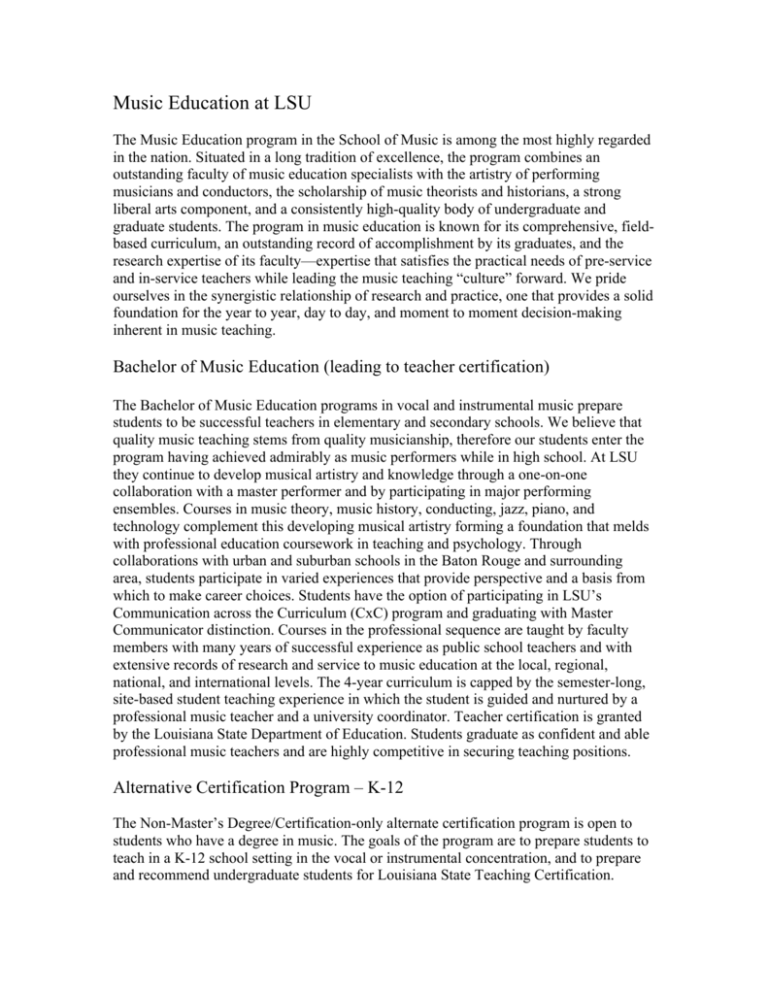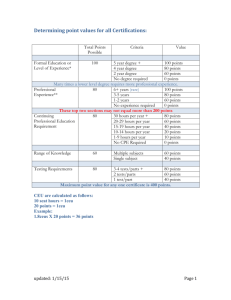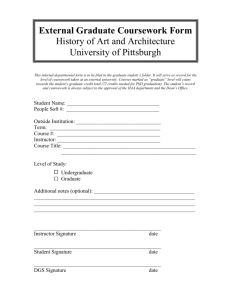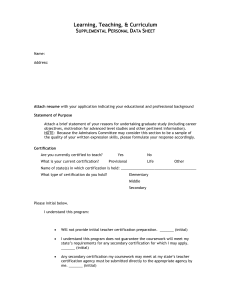Music Education at LSU
advertisement

Music Education at LSU The Music Education program in the School of Music is among the most highly regarded in the nation. Situated in a long tradition of excellence, the program combines an outstanding faculty of music education specialists with the artistry of performing musicians and conductors, the scholarship of music theorists and historians, a strong liberal arts component, and a consistently high-quality body of undergraduate and graduate students. The program in music education is known for its comprehensive, fieldbased curriculum, an outstanding record of accomplishment by its graduates, and the research expertise of its faculty—expertise that satisfies the practical needs of pre-service and in-service teachers while leading the music teaching “culture” forward. We pride ourselves in the synergistic relationship of research and practice, one that provides a solid foundation for the year to year, day to day, and moment to moment decision-making inherent in music teaching. Bachelor of Music Education (leading to teacher certification) The Bachelor of Music Education programs in vocal and instrumental music prepare students to be successful teachers in elementary and secondary schools. We believe that quality music teaching stems from quality musicianship, therefore our students enter the program having achieved admirably as music performers while in high school. At LSU they continue to develop musical artistry and knowledge through a one-on-one collaboration with a master performer and by participating in major performing ensembles. Courses in music theory, music history, conducting, jazz, piano, and technology complement this developing musical artistry forming a foundation that melds with professional education coursework in teaching and psychology. Through collaborations with urban and suburban schools in the Baton Rouge and surrounding area, students participate in varied experiences that provide perspective and a basis from which to make career choices. Students have the option of participating in LSU’s Communication across the Curriculum (CxC) program and graduating with Master Communicator distinction. Courses in the professional sequence are taught by faculty members with many years of successful experience as public school teachers and with extensive records of research and service to music education at the local, regional, national, and international levels. The 4-year curriculum is capped by the semester-long, site-based student teaching experience in which the student is guided and nurtured by a professional music teacher and a university coordinator. Teacher certification is granted by the Louisiana State Department of Education. Students graduate as confident and able professional music teachers and are highly competitive in securing teaching positions. Alternative Certification Program – K-12 The Non-Master’s Degree/Certification-only alternate certification program is open to students who have a degree in music. The goals of the program are to prepare students to teach in a K-12 school setting in the vocal or instrumental concentration, and to prepare and recommend undergraduate students for Louisiana State Teaching Certification. This Alternative Certification program requires 33 hours. Candidates in the instrumental and vocal concentrations take the same courses in knowledge of the learner and learning environment, methodology and teaching, and student teaching, and different courses where content and skill development are unique to instrumental or vocal music. In the alternative certification program, a degree in music from an NASM-accredited university is required, as is a minimum overall grade point average of 2.5. Possessing a degree in music ensures that candidates for certification are well-trained musicians and knowledgeable in the content area. Coursework required for this program parallels coursework required for the Baccalaureate degree in Music Education. Therefore, because of scheduling considerations and cost to the University, it is highly unlikely that candidates will be able to teach full time while earning certification through this program. The majority of the candidates are students enrolled in a Master of Music degree in music education, performance, or conducting who will earn certification during the same time period. The other candidates are students who elect to engage in full-time coursework toward certification. Master of Music – Music Education The Master of Music degree has two tracks. A 36-hour option is designed for students interested in advanced study as a stepping-stone to a doctorate and culminates in a master’s thesis. Thesis research is designed, carried out, and written in consultation with a faculty member. A 30-hour option is designed for teachers who intend to make use of broadened and refined knowledge and skill by returning to the elementary or secondary classroom and rehearsal hall. This track, which can be completed in four summers if no remedial coursework is required, culminates with a comprehensive exam. You will find the curriculum in the Graduate Student Handbook at http://www.music.lsu.edu/Prospective/Graduate/index.html Doctor of Philosophy – Music Education Doctor of Philosophy – Music Education (emphasis in Piano Pedagogy) The Ph.D. in Music Education, with a strong research emphasis, leads to careers in teaching, scholarship, and leadership in all avenues of professional music education. Candidates for the program have at least 3 years of successful music teaching experience. Students commit to a 3-year residency, the minimum it takes to complete a 53-hour curriculum that includes coursework in music education, music theory, music history, research techniques, minor area, and dissertation. You will find the curriculum in the Graduate Student Handbook at http://www.music.lsu.edu/Prospective/Graduate/index.html. Students have much latitude in choosing a minor area of concentrated study (12 hours), for example, psychology, anthropology, educational leadership, gifted education, piano pedagogy, applied music, conducting. Graduate assistantships provide opportunities for students to serve as research assistants, teaching assistants, fieldwork supervisors, and teachers of record. Graduate students and faculty interact regularly in an informal “Research Group” forum devoted to student-centered conversation about and development of scholarly ideas. For the dissertation, students collaborate with a faculty mentor, choose an important question to answer in music education, and opt for an appropriate mode of inquiry—quantitative, qualitative, or mixed methods. At the completion of the degree, students leave as our colleagues and are prepared to be excellent teachers, researchers, and leaders in music education.




